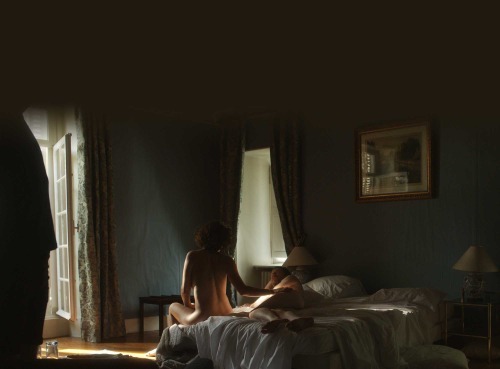
Tim here. The cut-off date for countries to choose their official submission for the Best Foreign Language Film Oscar was October 1, and while the list hasn’t been officially confirmed by the Academy yet (and there’s a good chance of one or two titles falling out), it gives us something to work with.
And, wonder of wonders, there even happens to be an animated feature among this year’s official submissions, something that has only happened around a dozen times in the past (only once of that dozen times did the animated picture make the final nominee list: in 2008, Israel’s submission of Waltz with Bashir made the cut, losing to Japan’s Departures). The film is the semi-fictional Rocks in My Pockets, directed by New York-based Signe Baumane, and I will suggest right off that it has a an unhappily good chance of being disqualified: spoken entirely in English by the filmmaker, and made on a mixture of American and Latvian money, it has all the feel of those movies that the Academy rejects for being insufficiently native to the country making the submission.
All the more reason for me to sing its praises right now, while it’s still making its nigh-invisible crawl across the U.S. For it’s a pretty special little film, all in all: a personal recollection of Baumane’s history battling depression, nestled into a family history by which she traces how suicidal thoughts and other mentally imbalances have plagued women in her family since Latvia in the days before it was absorbed into the Soviet Union.

Cheery stuff for a cartoon. But one of the best things about Rocks in My Pockets is the way that Baumane brings in a sense of frank humor to discussing terrible subjects, such as the amount of energy she’s put into the way she’d kill herself to avoid making too much mess if her bowels vacated. That’s the series of observations that opens the movie, in fact, setting up some immediate rules for the film to follow: one is that we can expect her to hold absolutely nothing back and refuse completely to hide behind clinical language or euphemisms; two is that she’s not angling for any kind of sympathy or asking to be treated delicately. It’s a film that invites us to dive right in and confront the reality of depression and suicide candidly, but without nervous solemnity.
It helps that the stories Baumane recounts about her family (the film ends with the standard “some characters and incidents were invented” disclaimer, so it’s not absolutely clear how much of this is truth and how much is an interpretive version of truth) are so damn compelling. Most of the film isn’t about Baumane, but her paternal grandmother Anna, whose life as a mother of eight children in Soviet Latvia provides the usual range of anecdotes about the grinding poverty of life in the USSR, so horrifying that it’s almost impossible not to start laughing at the sheer absurd awfulness of it.

And while Baumane’s thick accent ends up forcing her into some weird emphases of words and whole sentences, she’s an enthusiastic, engaging storyteller, relaying even the ugliest stories with briskness and humor, and employing a range of voices to give personality to the various relatives whose lives she relives.
The film’s mixed-media style – papier-mâché sets over which are layered character drawings that have the look of colored pencils, for the most part – pairs neatly with Baumane’s ebullient way of reciting. Weirdly, given the content, Rocks in My Pockets ends up being awfully like a bedtime story: soft figures, lots of bunnies, comic voices, a tendency for the narrator to start laughing at her own punchlines as our cue that it’s okay to laugh, too.

And yet for all that, it’s still a really smart, potent discussion about depression. The light style and conversational approach, all making sure that it doesn’t get too grim and confessional, has given Baumane the freedom to share bleak truths without having to dwell on them in anguish. The sketchbook-style artwork allows her to visualize the sensations of depression using visual symbolism and distortions that hammer home the sense of broken perception that comes along with depression. No matter how funny and energetic the film gets, it goes to some really shattering, serious places. Baumane is a terrific memoirist, both honest in her observations and witty in her expression, and while I’d put Rocks in My Pockets as having something like no chance of making it all the way to the Academy’s finalist list, I think that even the little bit of exposure it now has is a wonderful thing it if puts more people in line to watch this insightful and discomfiting psychological portrait.
16 Foreign Oscar Submissions Reviewed To Date: Argentina, Australia, Belgium, Brazil, Canada, Cuba,France, Germany, Iceland, Latvia, Mauritania, Norway, Poland, Portugal, Sweden and Venezuela
 Friday, October 3, 2014 at 10:40AM
Friday, October 3, 2014 at 10:40AM  I'm pairing these three films (Ming of Harlem, The Princess of France, and Hill of Freedom) for that reason and also because they all have "of" in the title. Deep reasons. Here we go...
I'm pairing these three films (Ming of Harlem, The Princess of France, and Hill of Freedom) for that reason and also because they all have "of" in the title. Deep reasons. Here we go...
 Asian cinema,
Asian cinema,  NYFF,
NYFF,  Reviews,
Reviews,  cats,
cats,  film critics,
film critics,  foreign films,
foreign films,  zoology
zoology 













